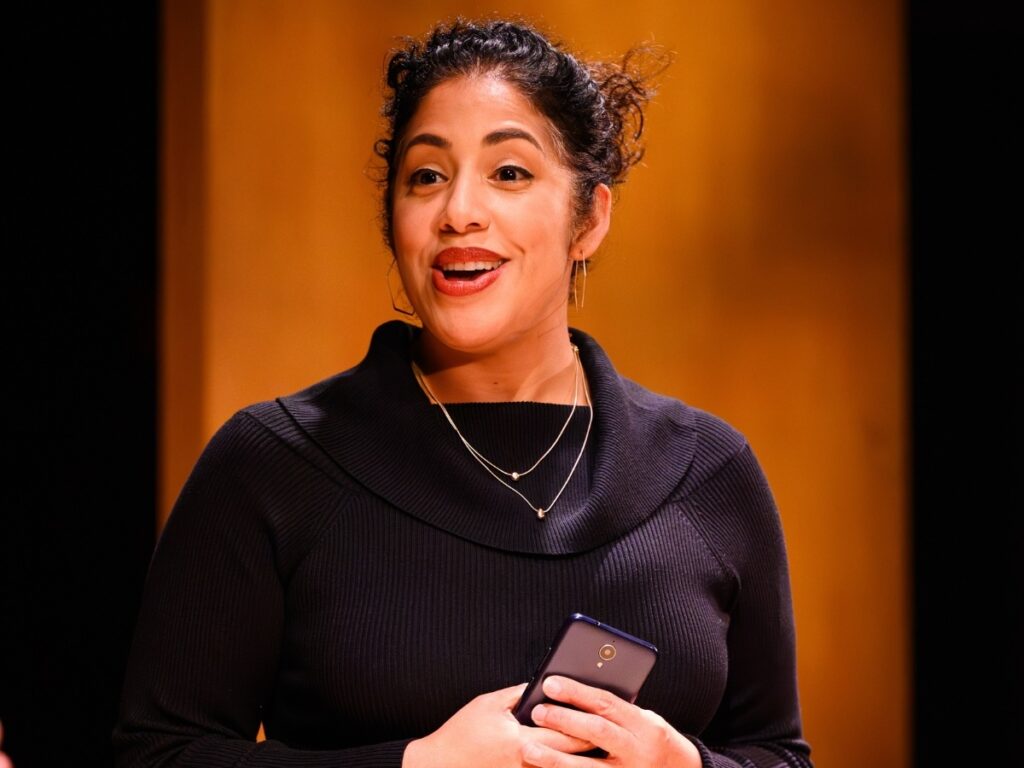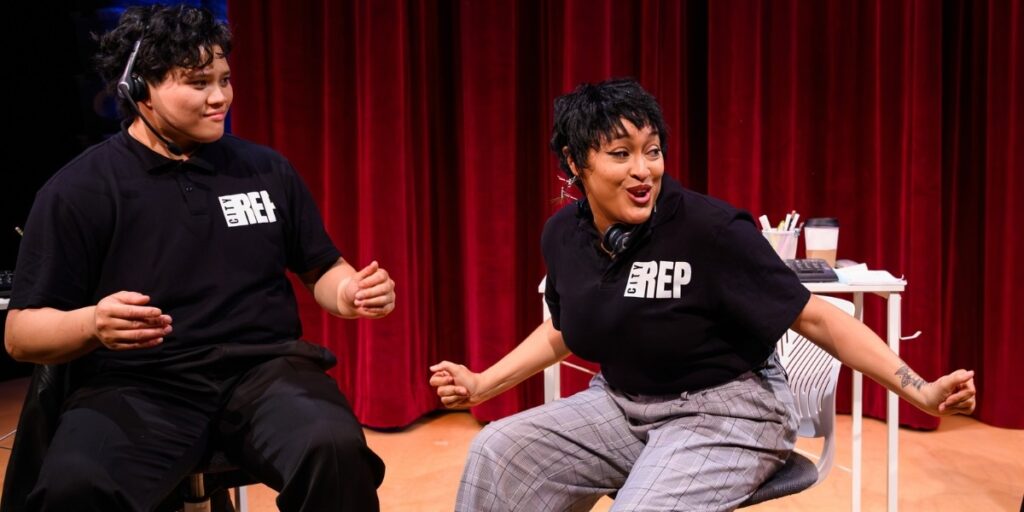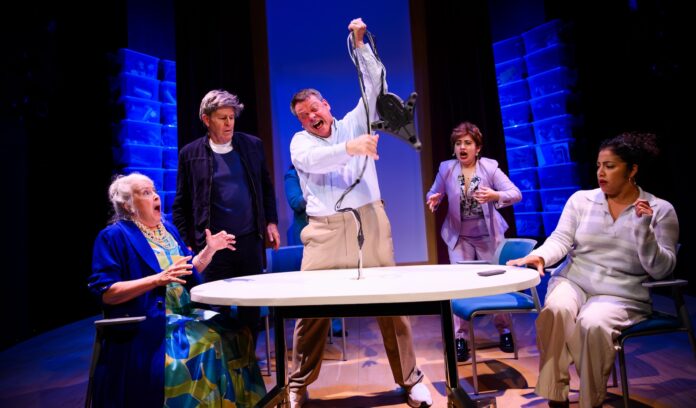Watching this play was weird for me, emotionally speaking. The script was written by someone for whom (full disclosure) I briefly worked as house manager, in the very venue where I did so. I spent the night before meeting potential housemates in a home just a few blocks away, and was scheduled for a similar meet-up several blocks in the opposite direction. Plus, it’s a story about the artform I love dearly, focusing on several roles which I’ve actively held.
So, yeah, I had an emotional reaction to watching Best Available (world premiere through June 18 at the Ashby Stage, Berkeley). I imagine that was playwright Jon Spector’s intention. The story is, after all, about the frustration of how established “independent” art finds itself on a proverbial hamster wheel of wanting to experiment, but not wanting to offend donors. That’s not my metaphor—the “hamster wheel” example is used in the script. In fact, it’s used as a punchline during one of the many sequences where the characters glide across Nina Ball’s phonograph-like rotating stage; not unlike the one at SF Playhouse. (The upstage wall is all props and costumes in stacked plastic bins. A red velvet curtain splits upstage and down.)
A company/venue like that could very well have served as inspiration for Spector’s fictional City Rep. Our story begins in 2019 (hint, hint), where the aforementioned company/venue just ousted its founding artistic director due to a scandal which is never specified, but bits of dialogue let us connect the dots in a post-#MeToo America. As such, company exec Helen (Shotgun regular Sarah Mitchell) reaches out to former City Rep member Maya (the always great Regina Morones) to leave her small theater work back east to be City’s interim artistic director before taking the role full-time. She’s given Helen’s promise that all the theater’s resources will be at her disposal to make bold, daring work. Sure enough, Maya accepts.

In other stories, that would be the happy ending. But Helen undersold just how much the (old, white, mostly-male) donors, subscribers, and board members prefer the status quo. In fact, they haven’t even agreed to let Maya take the reins. That’s why deep-pocket members like Bill (Steve Price) hire a pair of platitude-spouting recruiters (Price and fight choreographer Dave Maier, in a rare on-stage role) to conduct a series of interviews with more established—and expensive—potential successors to the infamous departing AD.
Even Maya’s apparent support from rich donor Dolores (Denise Tyrell) comes off as more for the latter’s benefit than Maya’s. And that doesn’t even get into the way Maya’s choice for a show—a new work about Palestine—is fighting an uphill battle against the option of a jukebox musical based around ‘80s and ‘90s TV themes.
There’s a line in Spector’s script that seemed to only amuse me on opening night. It’s when they’re interviewing a potential AD, a pretentious trust-fund baby who admits to not even going to theatre. Bill says that the company is looking for a “fresh perspective,” to which the woman replies “And that’s all I’m offering.” Something about that line rings so true it shook me. It’s spot-on how non-theatre folk see us.
That sort of insight captivated me with the play, even if I didn’t laugh at every punchline. No one is an absolute hero or moustache-twirling villain (except maybe the douche-y interviewee who proudly likens himself to Trump), they’re just all so sure that their way works, despite the fact that everyone’s losing money on this artistic venture. A semi-Greek chorus is made up of a trio of box office reps (linda maria girón, Storm White, Austine de Los Santos) who have to suppress their own sharp theatre commentary as they spit out company talking points as if they were pre-programmed to do so. One of them worked with Maya years ago, resulting in an awkward encounter that doesn’t put either of them at fault so much as illustrate that two people walking the same road aren’t headed towards the same destination.

Though not exactly a depiction of full-indie theatre, Spector’s script captures the absurdity of trying to be artistic in a capitalist world. As the old saying goes: “You can make a killing in theatre, but not a living.” That phrase takes on an even more uncomfortable significance with the knowledge that this production is directed by Jon Tracy. The former AD of TheatreF1rst oversaw that company’s bold attempt to pay each and every actor and tech a fair wage, only to become one of the many indie companies to go under in the past four years—though that wasn’t the sole factor behind their closure.
In fact, that brings me to the other subplot of the play: It takes place in 2019 for a reason. As the year goes on, the latter months find the characters occasionally commenting on “some flu” that’s starting to get press. More than even the play’s skewering of the growing threat of AI (to a somewhat anachronistic degree), COVID encircles the characters like a shark in the far-off waves.
It doesn’t make its presence known until it’s all-but-forgotten, subverting an otherwise optimistic moment. As I—one of maybe five masked patrons—sat in the theatre and watched my Aranet4 take CO² readings as high as 2600ppm, I couldn’t help thinking how our industry is not only still being hurt by the still-ongoing pandemic, but the wider rejection of mediating innovation (the show’s masked matinee will be on June 6th, the same date of the show’s livestream, with OnDemand video June 17–30) just does further harm. Evolution is needed.
For anyone with a genuine love of theatre, Best Available is uncomfortable in all the right ways. It contains almost everything we theatre folk have struggled with our entire careers, yet comes from the perspective of people who truly want the broke-ass artists to succeed without the dangled carrot of corporate financing. Whatever it doesn’t say is probably what I would have said myself, but – as the play shows – not everyone comes up with the same answer to the same question. At two acts and 2 ½ hours, it’s long-winded, but I’m at odds to say what I’d trim? (Certainly not the ticketing trio – they need their own sitcom.) I’d just suggest encouraging as many non-theatre folk to see it as you can.
They may finally see the method to your madness.
BEST AVAILABLE’s world premiere runs through June 16th at the Ashby Stage, Berkeley. Tickets and further info here.







